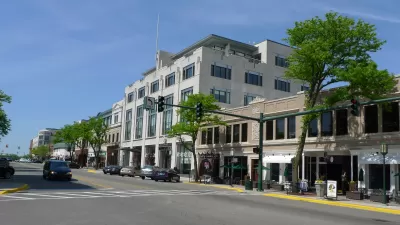Susan Henderson investigates Lean Urbanism strategies for incremental code reform to improve walkability and reduce financial and regulatory burdens in a manner that matches local capacity.
"We believe form-based codes are the most efficient, predictable, and elegant way to assure high levels of walkability and urbanism – even in more rural environments. However, the political and staff capacity of many local governments is not prepared for a full zoning reform effort. CNU is developing an agenda of incremental code reform that blends perfectly with the Lean Urbanism initiative funded by the Knight Foundation and led by the Center for Applied Transect Studies."
"Along with a number of other tools to implement Lean Urbanism, a Lean Code Tool is under development, and will be unveiled at CNU 24 in Detroit. A plenary on Saturday morning will introduce the tools, an Open Source session on Saturday afternoon will delve into the particulars, and a 202 day-long workshop on Wednesday will test the strategies."
Henderson goes on to give a sneak peek of the tool, and some thoughts on incremental zoning code reform.

FULL STORY: Lean Code Tool

Study: Maui’s Plan to Convert Vacation Rentals to Long-Term Housing Could Cause Nearly $1 Billion Economic Loss
The plan would reduce visitor accommodation by 25,% resulting in 1,900 jobs lost.

Alabama: Trump Terminates Settlements for Black Communities Harmed By Raw Sewage
Trump deemed the landmark civil rights agreement “illegal DEI and environmental justice policy.”

Why Should We Subsidize Public Transportation?
Many public transit agencies face financial stress due to rising costs, declining fare revenue, and declining subsidies. Transit advocates must provide a strong business case for increasing public transit funding.

Paris Bike Boom Leads to Steep Drop in Air Pollution
The French city’s air quality has improved dramatically in the past 20 years, coinciding with a growth in cycling.

Why Housing Costs More to Build in California Than in Texas
Hard costs like labor and materials combined with ‘soft’ costs such as permitting make building in the San Francisco Bay Area almost three times as costly as in Texas cities.

San Diego County Sees a Rise in Urban Coyotes
San Diego County experiences a rise in urban coyotes, as sightings become prevalent throughout its urban neighbourhoods and surrounding areas.
Urban Design for Planners 1: Software Tools
This six-course series explores essential urban design concepts using open source software and equips planners with the tools they need to participate fully in the urban design process.
Planning for Universal Design
Learn the tools for implementing Universal Design in planning regulations.
Smith Gee Studio
Alamo Area Metropolitan Planning Organization
City of Santa Clarita
Institute for Housing and Urban Development Studies (IHS)
City of Grandview
Harvard GSD Executive Education
Toledo-Lucas County Plan Commissions
Salt Lake City
NYU Wagner Graduate School of Public Service



























